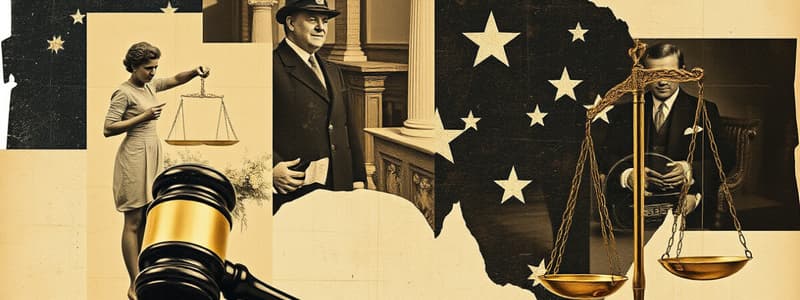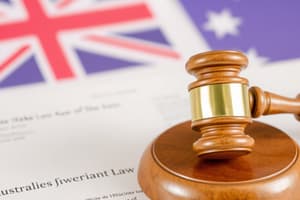Podcast
Questions and Answers
What is the primary function of the Legislative branch?
What is the primary function of the Legislative branch?
- To interpret the law
- To make and change the law (correct)
- To enforce the law
- To mediate disputes
Which of the following best describes the role of the High Court of Australia?
Which of the following best describes the role of the High Court of Australia?
- To enforce international law
- To oversee other courts
- To create new laws
- To interpret and apply the Constitution (correct)
Which statement about customary laws is true?
Which statement about customary laws is true?
- They are legally recognized in Australia
- They have a single uniform code across all tribes
- They are integrated into the Australian legal system (correct)
- They are solely for environmental law
What dictates the proper ways to interact within Aboriginal communities?
What dictates the proper ways to interact within Aboriginal communities?
In conflict resolution, what is the role of mediation?
In conflict resolution, what is the role of mediation?
What is a key characteristic of Aboriginal customary laws?
What is a key characteristic of Aboriginal customary laws?
What does arbitration involve in conflict resolution?
What does arbitration involve in conflict resolution?
What happens when sacred law is broken among Aboriginal people?
What happens when sacred law is broken among Aboriginal people?
Which court deals with the most serious criminal matters without any monetary limits?
Which court deals with the most serious criminal matters without any monetary limits?
What is the primary role of the Parliament in the law-making process?
What is the primary role of the Parliament in the law-making process?
What type of jurisdiction allows courts to hear cases for the first time?
What type of jurisdiction allows courts to hear cases for the first time?
What does a committal hearing determine?
What does a committal hearing determine?
Which of the following is an example of a summary offence?
Which of the following is an example of a summary offence?
Which type of court specializes in cases involving environmental law in New South Wales?
Which type of court specializes in cases involving environmental law in New South Wales?
What type of parliament consists of a single house or assembly?
What type of parliament consists of a single house or assembly?
Who represents the King in Australia?
Who represents the King in Australia?
What is the authority of courts to review appeals from lower court decisions called?
What is the authority of courts to review appeals from lower court decisions called?
What type of court hears civil matters concerning the protection and care of children?
What type of court hears civil matters concerning the protection and care of children?
What is the primary characteristic of tyranny as defined?
What is the primary characteristic of tyranny as defined?
What does common law refer to?
What does common law refer to?
What is the significance of the doctrine of precedent?
What is the significance of the doctrine of precedent?
What does 'stare decisis' require from lower courts?
What does 'stare decisis' require from lower courts?
Which of the following statements about the role of a jury is accurate?
Which of the following statements about the role of a jury is accurate?
In an adversarial system, who determines the burden of proof?
In an adversarial system, who determines the burden of proof?
What is the meaning of 'obiter dicta' in judicial decisions?
What is the meaning of 'obiter dicta' in judicial decisions?
How does the inquisitorial system differ from the adversarial system?
How does the inquisitorial system differ from the adversarial system?
What was the primary violation found in the Toonen v Australia case?
What was the primary violation found in the Toonen v Australia case?
What legislative act was passed as a result of Tasmania's refusal to repeal certain laws?
What legislative act was passed as a result of Tasmania's refusal to repeal certain laws?
Which branch of law includes the body of rules that punish certain acts or omissions?
Which branch of law includes the body of rules that punish certain acts or omissions?
What does administrative law NOT allow individuals to challenge?
What does administrative law NOT allow individuals to challenge?
Which method of review involves assessing decisions by a body outside the agency?
Which method of review involves assessing decisions by a body outside the agency?
What is the primary purpose of the Criminal Law as outlined in the provided content?
What is the primary purpose of the Criminal Law as outlined in the provided content?
Which legal concept focuses on the separation of powers within government?
Which legal concept focuses on the separation of powers within government?
Which of the following best describes judicial reviews of administrative decisions?
Which of the following best describes judicial reviews of administrative decisions?
What is the primary aim of tort law?
What is the primary aim of tort law?
Which legal concept refers to the monetary compensation for harm or loss suffered?
Which legal concept refers to the monetary compensation for harm or loss suffered?
What distinguishes private law from public law?
What distinguishes private law from public law?
What is a contract defined as?
What is a contract defined as?
What does civil procedure generally involve?
What does civil procedure generally involve?
Which of the following is NOT a function of judges in superior courts?
Which of the following is NOT a function of judges in superior courts?
In a civil case, what is the burden of proof standard known as?
In a civil case, what is the burden of proof standard known as?
Which role primarily prepares legal cases for barristers?
Which role primarily prepares legal cases for barristers?
What type of legal action can include injunctions?
What type of legal action can include injunctions?
What is the key difference between a tort and a crime?
What is the key difference between a tort and a crime?
Flashcards are hidden until you start studying
Study Notes
Overview of Law and Governance
- Hurricane Katrina triggered a temporary state of anarchy in parts of New Orleans in 2005.
- Tyranny involves governance by a single leader with absolute power, exemplified by Saddam Hussein’s regime in Iraq pre-2003.
Sources of Contemporary Australian Law
- Australia adopted a common law system upon British colonization, where laws are shaped by court decisions.
- Common law contrasts with laws imposed by parliament, with statutory law taking precedence over common law.
- Equity addresses injustices in common law, providing remedies through fair principles.
Common Law Principles
- Precedent establishes authority for future legal decisions to ensure consistency among judges.
- Stare decisis requires lower courts to follow the decisions made by higher courts.
- Ratio decidendi is the legal principle derived from a judgment, while obiter dicta include non-essential remarks.
Judicial Roles and Court Systems
- Magistrates and judges have distinct roles; magistrates handle minor cases in lower courts without juries.
- The adversarial system lets two parties control the presentation of their cases, with judges serving neutrally.
- In contrast, the inquisitorial system grants judges greater control over how a trial is conducted.
Court Hierarchy and Jurisdiction
- Australia has a structured court hierarchy: inferior, intermediate, and superior courts.
- Courts like the Land and Environment Court and the Children’s Court address specialized cases, such as environmental laws and children's welfare.
- The Supreme Court is the top court, dealing with serious criminal matters and having no limits on monetary jurisdiction.
Legislative Framework
- Statute law is legislated in parliament; both state and federal governments have law-making rights.
- Parliament’s roles involve debating, amending, and passing laws through a bicameral or unicameral system.
- The legislative process for a bill must pass through multiple stages before becoming law.
The Constitution and High Court
- The Australian Constitution defines the structure and powers of the legislative, executive, and judicial branches.
- The High Court has original and appellate jurisdiction, interpreting constitutional laws and ensuring government actions abide by the Constitution.
Indigenous and Customary Laws
- Indigenous Australian laws are not formally recognized but influence national law through practices like mediation.
- Approximately 500 Aboriginal nations exist, each with their own customs tied to the land and spiritual beliefs.
- Customary laws are often passed orally and include sanctions imposed by community elders.
Classification of Law
- Public law regulates the relationship between individuals and the state, including criminal and administrative laws.
- Criminal law protects public safety by punishing wrongdoings, with ongoing updates made to the Crimes Act 1900 (NSW).
- Administrative law enables individuals to challenge government decisions through specific review processes, including internal and external reviews.
Private Law and Common Legal Terms
- Private law manages disputes between individuals and organizations, governed by statutes and common law.
- Key legal concepts include civil action for rights infringement, damages for losses, and injunctions to prevent actions.
- Contract law governs legally binding agreements, while tort law addresses civil wrongs that do not arise from prior legal relationships.
Civil and Criminal Procedure
- In criminal cases, the prosecution bears the burden of proof, requiring evidence beyond a reasonable doubt.
- Civil cases operate under the balance of probabilities, where the plaintiff must show the likelihood of their claims.
Roles of Legal Personnel
- Judges serve in intermediate and superior courts, adjudicating cases and issuing rulings.
- Magistrates manage minor cases and administrative matters in lower courts.
- Solicitors handle non-litigious legal advice, while barristers represent clients in court, specializing in specific legal areas.
Studying That Suits You
Use AI to generate personalized quizzes and flashcards to suit your learning preferences.




